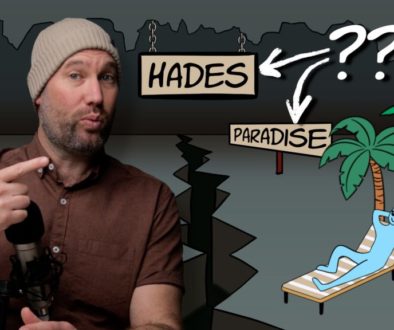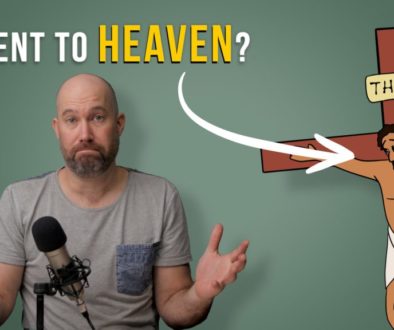Did The Thief On The Cross Go To Heaven? (Pt 4) What About “Today”?
Alright, let’s look at what Jesus meant by “today” when he said to the thief on the cross next to him, “today you will be with me in Paradise”.
If you’ve been following along, I’ve been saying that to interpret this story well we need to be able to make sense of 3 key pieces of the puzzle – paradise, today, and kingdom. The interpretation that I think makes the most sense, all things considered, is the one I presented in the last post, that Jesus was saying to the thief that he would be with him in the garden city of the New Jerusalem in in the age to come.
That interpretation makes the best sense of paradise and kingdom, but what about “today”?
When Jesus said, “today you will be with me in Paradise,” that suggests that wherever paradise is, they would both be there that same day after they died.
That’s the plainest reading of “today”.
But if that’s the case, then interpretation #2 – that paradise is a compartment of Hades – would be the only legitimate interpretation. Because according to the Bible, the only place Jesus went in the 24 hours after he died was to the realm of the dead – Hades.
But plenty of biblical scholars suggest that Jesus didn’t mean “in the next 24 hours” when he said to the thief “today you will be with me in paradise.” There’s actually a few theories on this, but I’ll just mention the main two.
The first one is a matter of grammar and punctuation.
Now, I can’t read New Testament Greek, but several New Testament scholars who can have pointed out that there is actually no punctuation, no comma, in the original Greek text. And according to the rules of Greek grammar, when this verse is translated into English the comma could go either before OR after the word “today” in Jesus’ statement.
So it could read either, “I tell you the truth, today you will be with me in paradise,” as most English translations have it. Or it could read, “I tell you the truth today, you will be with me in paradise.” Either of those translations are equally valid.
And apparently several of the earliest translations of the Bible do, in fact, place the comma after “today”. Which would mean that “today” is when Jesus was telling the truth, not when the thief would be with him in paradise.
Check out this article for a more in-depth look at the comma theory.
Now, the main pushback against placing the comma after “today” is that it makes “today” a completely unnecessary word in the sentence. Why would Jesus need to mention that he’s telling the truth “today”? Surely that’s obvious, because “today” is when he’s speaking.
But we have a very similar phrase in modern english: “I’ll tell you right now.”
“Uh, yeah, you don’t have to tell me that you’ll tell me right now, I know that it’s right now while you’re telling me.”
It’s called a figure of speech. “I’ll tell you right now,” is a figure of speech we use to give emphasis to what we’re saying. It means, “pay attention, I’m really serious about what I’m saying right now.”
Jesus saying, “I tell you the truth today,” is a similar figure of speech. He’s giving emphasis to what he’s saying:
“I tell you the truth today, you will be with me in paradise, the garden city of the New Jerusalem, in the age to come.”
A second theory is that Jesus did mean “today you will be with me in paradise”, but that he meant “today” according to the thief’s perspective. As in, after the thief died, the very next thing he would be aware of – as if it were the same day – is resurrection, final judgement and then being present in paradise, in the new creation.
A fairly deeply ingrained idea for most people – not just Christians, this is across multiple belief systems – is the idea of an immortal soul. The idea that after the body dies, the soul lives on somewhere in a conscious state. Whether that’s in heaven, or hades or purgatory or some other place.
But the way the Bible most often speaks about the dead is using the metaphor of “sleep”. The dead are “asleep”. And then, they “awake” at the resurrection. This metaphor of “sleeping” in death suggests that there’s nothing going on for a dead person – no activity, no awareness of anything – until they “awake” at resurrection. Like someone being in a coma for years, who has no conscious thoughts and no awareness of the time passing, a dead person has no awareness of anything between death and resurrection.
So for the thief on the cross, from his perspective, there would be no concept of time passing while he was dead. He would die, or “fall asleep”, and then the very next thing he would experience would be “waking up” in resurrection. And so for him, it would seem like “today” that he both dies and then finds himself in paradise.
There are other theories about “today” as well, but these are probably the main two. The point is, there are legitimate ways in biblical scholarship to interpret “today” in a way that works with the thief entering paradise sometime in the future, in the age to come.
So wrapping up this little series about the thief on the cross going to paradise, here’s why I think interpretation #3 – that I presented in the previous post – is the clear winner out of the 3 different interpretations that we’ve looked at:
It is the only one that can line up all three key pieces of the puzzle – paradise, today, and kingdom. It is also the one that views paradise as it was most commonly understood by Jews. And it is the only one that makes any sense at all of “kingdom”, which is actually the foundational context for this story.
So let me know what you think. Have you found what I’ve presented convincing? Is this whole topic clearer? Or do you think I’ve missed something important?
Let me know in the comments.



April 30, 2024 @ 8:23 am
👍👍